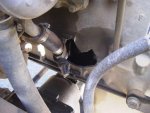- 10,349
- 94
- 48
- Location
- Meadows of Dan, Virginia
Hate to bring up my little engine problem again, but I would like to know how close I am to a catastrophic failure.
The engine is knocking, apparently on one cylinder only, number six. It has been doing this to some extent since before the California trip, 7,000 miles ago. Before and during the trip I asked a number of people about it and the problem was more or less shrugged off.
Perhaps I'm paranoid now and hear it so much more clearly, but it sounds louder than it used to. Loud at idle, not so bad when driving.
Question: What is the sequence of events for a failure caused by a worn rod bearing, not overrevving?
The engine is never (at least not to my knowledge) overrevved and I only run it at about 2,000 rpm max these days.
Engine oil pressure is low, even with fresh oil, about 20-25 on the road and as low as 10 at idle after it gets warmed up.
Thanks for any insight.
The engine is knocking, apparently on one cylinder only, number six. It has been doing this to some extent since before the California trip, 7,000 miles ago. Before and during the trip I asked a number of people about it and the problem was more or less shrugged off.
Perhaps I'm paranoid now and hear it so much more clearly, but it sounds louder than it used to. Loud at idle, not so bad when driving.
Question: What is the sequence of events for a failure caused by a worn rod bearing, not overrevving?
The engine is never (at least not to my knowledge) overrevved and I only run it at about 2,000 rpm max these days.
Engine oil pressure is low, even with fresh oil, about 20-25 on the road and as low as 10 at idle after it gets warmed up.
Thanks for any insight.


